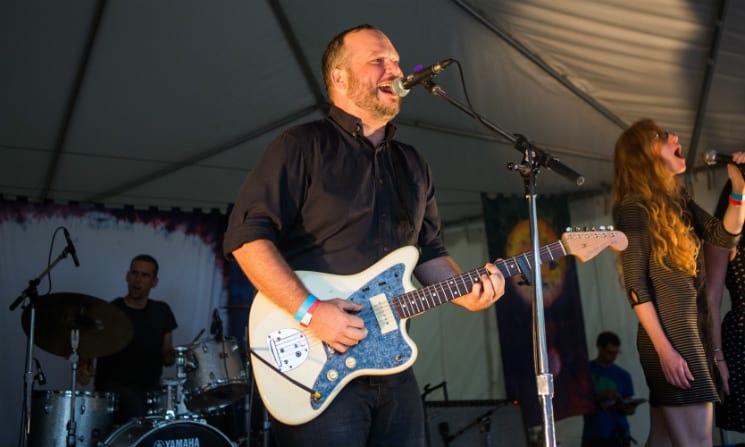Anyone who's seen Bruce Peninsula live knows that they're a force of nature, and their shows are often more akin to a geological event than a regular old concert. This was made clear when it coincidentally started raining as they took the stage at Camp Wavelength. "It's nice, right?" asked vocalist and guitarist Matt Cully. "It's good for cooling everyone off."
With Bruce Peninsula onstage, it was easy to forget for a second that it wasn't actually a particularly hot day, and that any cooling the audience needed was a result of the heat generated by the band.
When they played old favourites from their two classic LPs, A Mountain is a Mouth and Open Flames, they worked both intensely and confidently to conjure the same fire that made those songs so wonderfully dangerous-sounding on record. Between the howling vocalists — four-strong, forming a wall of sound to the left of Cully — and the pounding percussionists, they made a cacophony of noise that was limited only by the capacity of the venue's generator-powered sound system.
That limitation, unfortunately, was a significant damper on the band's sound at times. At times when they should've reached peak energy, their guitars and vocals seemed tinny and thin, unable to break past the barrier between them and the audience.
This wasn't their fault, of course, but it raised a question for next year's edition of Camp Wavelength. For a band like Bruce Peninsula, whose sound is almost bigger when it's unamplified, why not have them set up on the beach? It might be a crazy and impractical idea, but the beauty of a small, curated, and experimental festival like Camp Wavelength is that it lets you indulge crazy ideas.
With Bruce Peninsula onstage, it was easy to forget for a second that it wasn't actually a particularly hot day, and that any cooling the audience needed was a result of the heat generated by the band.
When they played old favourites from their two classic LPs, A Mountain is a Mouth and Open Flames, they worked both intensely and confidently to conjure the same fire that made those songs so wonderfully dangerous-sounding on record. Between the howling vocalists — four-strong, forming a wall of sound to the left of Cully — and the pounding percussionists, they made a cacophony of noise that was limited only by the capacity of the venue's generator-powered sound system.
That limitation, unfortunately, was a significant damper on the band's sound at times. At times when they should've reached peak energy, their guitars and vocals seemed tinny and thin, unable to break past the barrier between them and the audience.
This wasn't their fault, of course, but it raised a question for next year's edition of Camp Wavelength. For a band like Bruce Peninsula, whose sound is almost bigger when it's unamplified, why not have them set up on the beach? It might be a crazy and impractical idea, but the beauty of a small, curated, and experimental festival like Camp Wavelength is that it lets you indulge crazy ideas.
